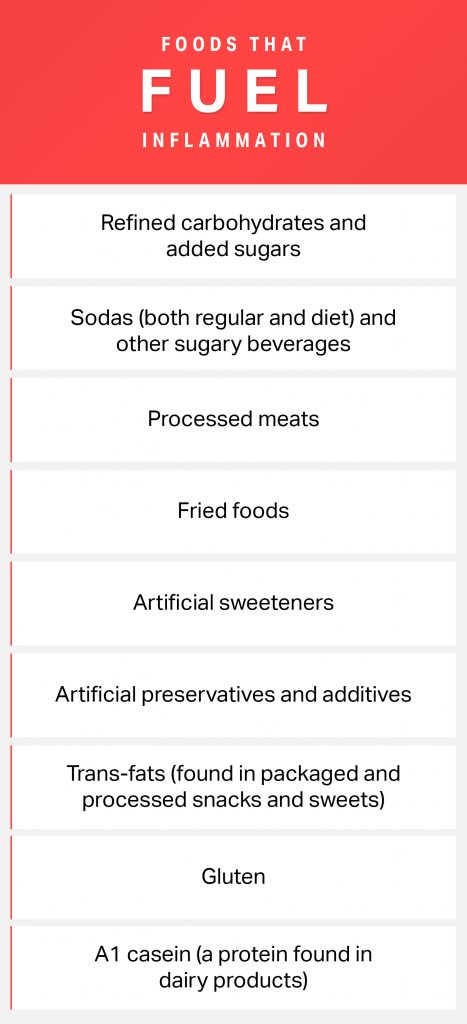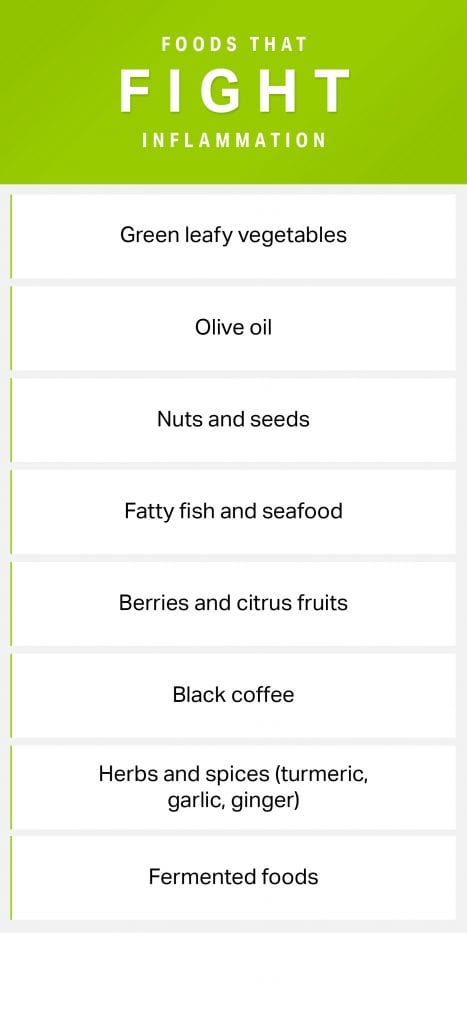We cover a lot of ground when it comes to nutrition at MyFitnessPal. Some of the topics can be tricky and deserve further explanation from our experts. Now is your chance to ask for clarity! Every few weeks I’ll pick a few of your questions to answer in detail.
[perfectpullquote align=”full” cite=”” link=”” color=”HEX 0073bb” class=”” size=””]”I’m hearing a lot about belly fat and inflammation. How are the two connected and how can I reduce them both?”[/perfectpullquote]
Belly fat. Not exactly the most flattering term in the health industry, but a very real, very powerful indicator of one’s health status. More scientifically known as visceral fat, belly fat is the kind of fat that surrounds your organs, causing your belly to bulge when you start accumulating too much of it. It can be quite dangerous for your health, too; a leading predictor of heart disease, Type 2 diabetes, insulin resistance and even cancer.
So what does belly fat have to do with inflammation? A lot, actually. Inflammation is our body’s natural defense system. There are two types: acute and chronic. Acute inflammation is the one you can physically see in action – like redness and swelling when you cut your finger. Chronic inflammation, on the other hand, is a bit more undetectable to the naked eye. It’s sneaky.
THE DANGERS OF CHRONIC INFLAMMATION
Chronic inflammation occurs when our body responds to unwanted substances in the body, like excess fat cells that accumulate in the belly area. Like the name suggests, chronic inflammation doesn’t turn “on” and “off” like acute inflammation. The body turns “on” and stays activated for long periods of time making us sick. As fat cells continue to accumulate in the belly area, your body responds by continuously producing insulin — a hormone that “unlocks” your body’s muscle, liver and fat cell doors to allow glucose inside to be stored. Over time, these muscle, fat and liver cells stop responding as efficiently to the insulin. The keys stop working, glucose builds up in the blood, and our body shifts into overdrive to pump out more insulin. But no matter how much insulin our body produces, not enough cells “unlock” to absorb the glucose. Simply put, we become one giant hormonal imbalance, which leads to a whole slew of other problems like high blood pressure, high cholesterol and even cardiovascular disease. But it doesn’t stop there. This imbalance, or stress, causes our bodies natural defense system — inflammation — to kick in and release even more chemicals to try and fight it. In small doses, inflammation is a good thing. But over time, you end up with too much of it. Our bodies aren’t designed to be on high alert all the time.
READ MORE > THE SECRET BEHIND THE WEIGHT GAIN-INFLAMMATION CONNECTION
WAYS TO COMBAT INFLAMMATION
So what can you do about it?
Losing weight — and belly fat — can drastically help reduce inflammation. “Many experimental studies have shown that components of food or beverages may have anti-inflammatory effects,” says Dr. Frank Hu, professor of nutrition and epidemiology at the Harvard School of Public Health.


It all starts with a healthy diet and lifestyle. Add more foods that fight inflammation into your diet, cut out those that fuel the imbalance, and you’ll start to look better, feel better and possibly even help your body prevent certain diseases and illnesses.
READ MORE ASK THE DIETITIAN STORIES:
> IS SUGAR REALLY ADDICTIVE?
> 5 NUTRITION TRICKS FOR PICKY EATERS
> THE CASE AGAINST DIET SODA
Make progress on nutrition and fitness goals with our “Plans” feature in the MyFitnessPal app for daily coaching and easy-to-follow tasks.





